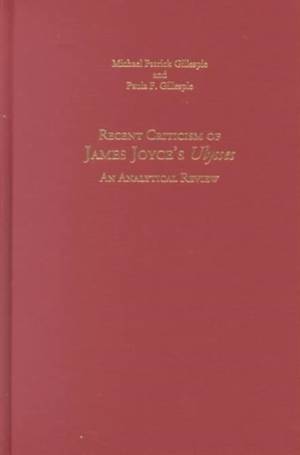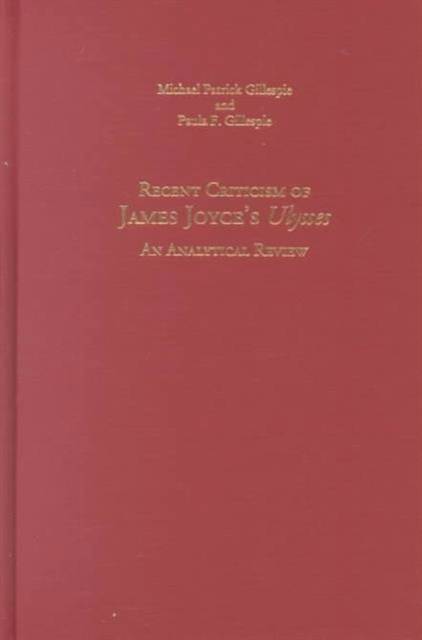
Je cadeautjes zeker op tijd in huis hebben voor de feestdagen? Kom langs in onze winkels en vind het perfecte geschenk!
- Afhalen na 1 uur in een winkel met voorraad
- Gratis thuislevering in België vanaf € 30
- Ruim aanbod met 7 miljoen producten
Je cadeautjes zeker op tijd in huis hebben voor de feestdagen? Kom langs in onze winkels en vind het perfecte geschenk!
- Afhalen na 1 uur in een winkel met voorraad
- Gratis thuislevering in België vanaf € 30
- Ruim aanbod met 7 miljoen producten
Zoeken
Recent Criticism of James Joyce's Ulysses
An Analytical Review
Michael Patrick Gillespie, Paula Gillespie
€ 177,45
+ 354 punten
Omschrijving
Since its appearance in 1922, James Joyce's novel Ulysses has remained extremely popular, never having gone out of print. Since the expiration of its copyright in the early 1990s, almost every major press in the US and England has produced an edition of the novel. This widespread public interest, in turn, has led well-known literary critics--from T. S. Eliot and Ezra Pound to Terry Eagleton and Homi Bhabha--to attempt to explain the intricacies of the great novel. Debate continues over even the most fundamental aspects of its plot, characterization, and themes. Every year, more and more scholars offer insights into the structure and style of Joyce's writing, the significance of his imagery, the consequences of his ideological dispositions, the association between his fictional representations and a myriad of cultural, social, and communal institutions and beliefs. Merely remaining cognizant of the range of views of Ulysses now offered has become a daunting task for any student of Joyce, especially in view of the explosion of critical viewpoints available to today's critics. While no single work could fully synthesize all that has been written on Ulysses, this book distinguishes the features of major methodological trends and important critical studies that have shaped our sense of Joyce's novel in recent years.
Specificaties
Betrokkenen
- Auteur(s):
- Uitgeverij:
Inhoud
- Aantal bladzijden:
- 154
- Taal:
- Engels
- Reeks:
- Reeksnummer:
- nr. 19
Eigenschappen
- Productcode (EAN):
- 9781571132178
- Verschijningsdatum:
- 1/11/2000
- Uitvoering:
- Hardcover
- Formaat:
- Genaaid
- Afmetingen:
- 152 mm x 229 mm
- Gewicht:
- 371 g

Alleen bij Standaard Boekhandel
+ 354 punten op je klantenkaart van Standaard Boekhandel
Beoordelingen
We publiceren alleen reviews die voldoen aan de voorwaarden voor reviews. Bekijk onze voorwaarden voor reviews.









